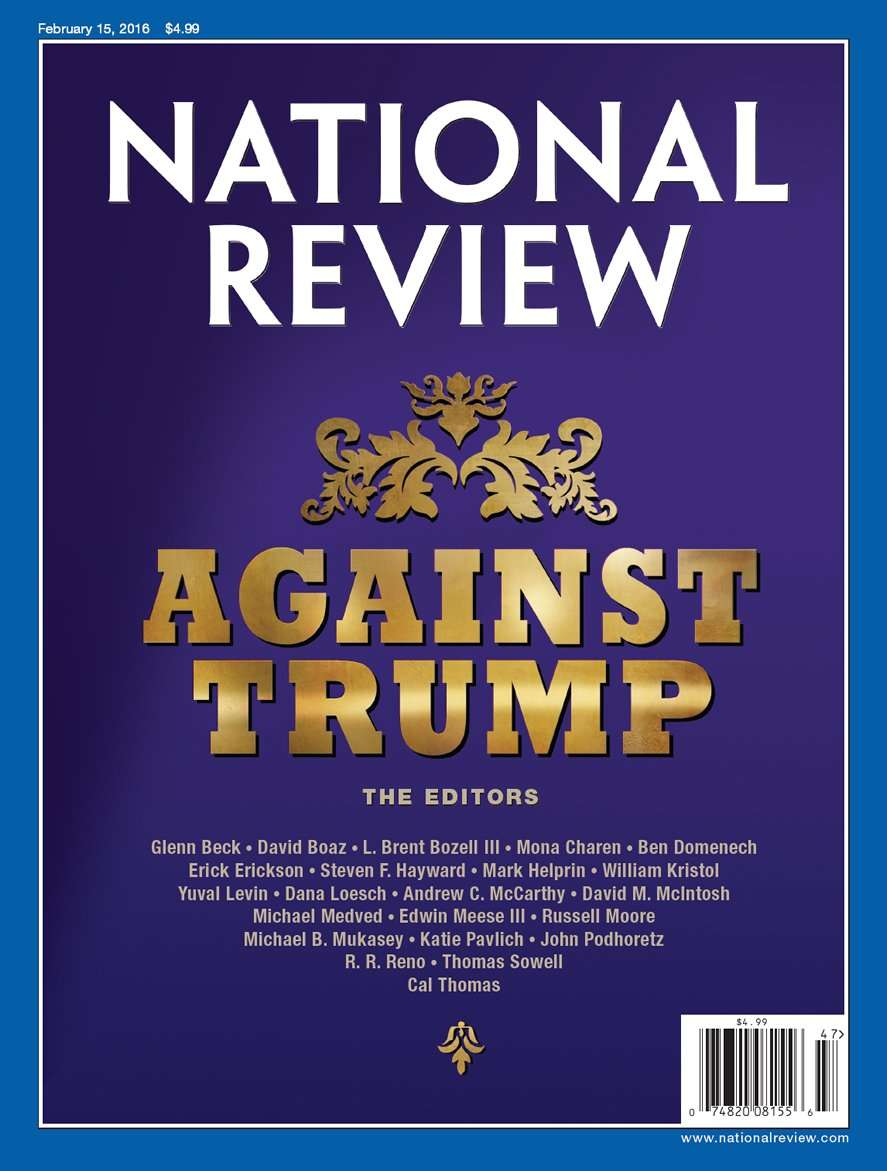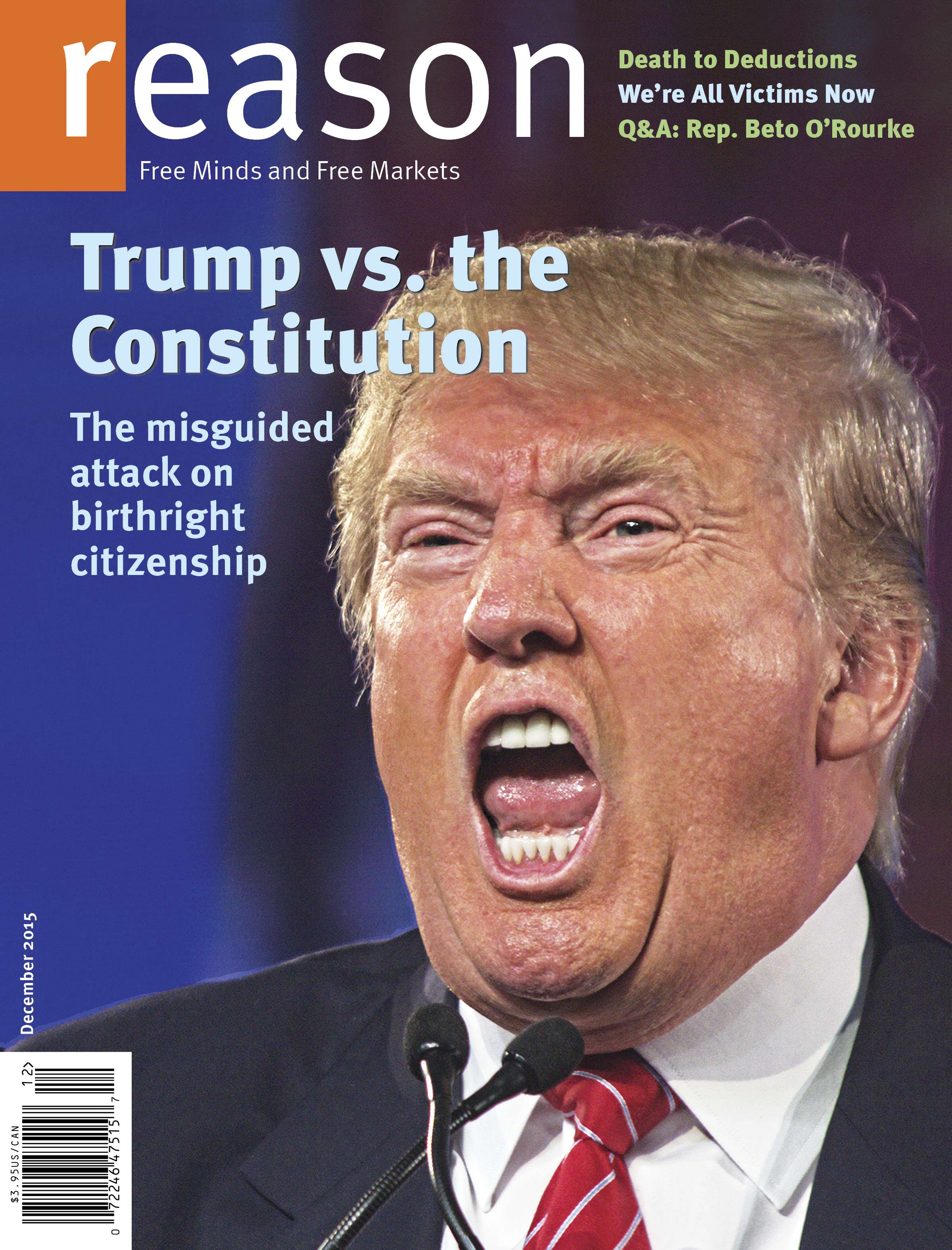National Review Comes Out 'Against Trump'
Conservative flagship publishes group hit piece featuring Glenn Beck, Ed Meese, Thomas Sowell, Bill Kristol, John Podhoretz, David Boaz, the Editors, and more

"Trump is a philosophically unmoored political opportunist who would trash the broad conservative ideological consensus within the GOP in favor of a free-floating populism with strong-man overtones," reads the house editorial in National Review's latest issue, which went live tonight. With that mostly accurate observation (is it really a consensus?), post-war conservatism's flagship magazine decisively preferences its withering anti-Donaldism during this campaign season over its persistent sympathy with his anti-immigrant rants, while also continuing its long tradition of carrying out ideological purges in the service of attempting to define what conservatism means.
So what are the arguments against? Glenn Beck points out that Trump, unlike many of the Tea Partiers who support him, was a strong supporter of the post-financial crisis bailouts:
When conservatives desperately needed allies in the fight against big government, Donald Trump didn't stand on the sidelines. He consistently advocated that your money be spent, that your government grow, and that your Constitution be ignored.
The charge of insufficient and too-recently-minted conservatism is one of the package's main themes, echoed therein by Erick Erickson, First Things Editor R.R. Reno ("By comparison, Hillary Clinton is a principled public figure"), Dana Loesch, Katie Pavlich, Cal Thomas, and L. Brent Bozell III ("Trump might be the greatest charlatan of them all").
There are many such insults, sure to prove tonic for both fan and hater alike. Mona Charen wonders, "Who, except a pitifully insecure person, needs constantly to insult and belittle others including, or perhaps especially, women?" Novelist Mark Helprin says, "He doesn't know the Constitution, history, law, political philosophy, nuclear strategy, diplomacy, defense, economics beyond real estate, or even, despite his low-level-mafioso comportment, how ordinary people live." Club for Growth President David McIntosh decries "the ramblings of a liberal wannabe strongman who will use and abuse the power of the federal government to impose his ideas on the country." And William Kristol turns his nose up at "two-bit Caesarism" while musing, "Isn't Donald Trump the very epitome of vulgarity?"

Some libertarian arguments are presented as well. Cato Institute Executive Vice President David Boaz argues that "Trump's greatest offenses against American tradition and our founding principles are his nativism and his promise of one-man rule." Federalist Publisher Ben Domenech states succinctly that "the case for constitutional limited government is the case against Donald Trump."
While there are some positive nods toward Trump's immigration policies, I was gratified to see this comment (given the venue) by radio host Michael Medved:
Building a yuuuuge wall along the southern border hardly qualifies as a "cautiously moderate" approach, nor would uprooting 11 million current residents (and, presumably, millions more of their American-citizen children and spouses) in the greatest forced migration in human history.
And former Attorney General Michael B. Mukasey cuts to the quick on the real estate mogul's foreign policy bluster:
Trump says he would order the military to kill the families of terrorists. That would be a direct violation of the most basic laws of armed conflict, which require that deadly force be used only when required by military necessity, under circumstances that allow distinction between military and civilian targets, and when incidental damage to non-military targets is proportional to the military advantage gained. A military that adhered to the laws of armed conflict would necessarily disobey such an order; if it followed the order, both the person who gave it and those who followed it would be subject to prosecution for war crimes.
Amidst the barbs and eye-rolls also come the occasional whiff of despair. John Podhoretz pre-laments that, "Should his election results match his polls, he would be, unquestionably, the worst thing to happen to the American common culture in my lifetime." And Thomas Sowell plays the H-card: "The actual track record of crowd pleasers, whether Juan Perón in Argentina, Obama in America, or Hitler in Germany, is very sobering, if not painfully depressing."
Trump's Twitter feed as I write this is filling up with anti-NR vitriol:
National Review is a failing publication that has lost it's way. It's circulation is way down w its influence being at an all time low. Sad!
Very few people read the National Review because it only knows how to criticize, but not how to lead.
The late, great, William F. Buckley would be ashamed of what had happened to his prize, the dying National Review!
There's one thing this dispute symbolizes, aside from the ongoing (and long-running) battle for the soul of the modern Republican Party. And that is this: Many or even most of the people who make a living working in politics and political commentary—even those who think of themselves as outsiders, such as nonpartisan libertarians—inevitably begin to view their field as one dedicated primarily to ideas, ideology, philosophy, policy, and so forth, and NOT to the emotional, ideologically unmoored cultural passions of a given (and perhaps fleeting) moment. Donald Trump—and more importantly, his supporters, who go all but unmentioned here (Ben Domenech is an exception)—illustrate that that gap is, well, yuuge.
Yes, Trump is nobody's conservative, but it's not at all clear that many voters really care about such things. His rise is a rebuke to the stories that political commentators have long told themselves, and to the mores they have long shared even while otherwise disagreeing ideologically with one another. You can despise Donald Trump (and oh Lord I do), and appreciate National Review's efforts here, while simultaneously wondering whether his forcible removal of a certain journalistic mask might also have some benefit.


Show Comments (248)